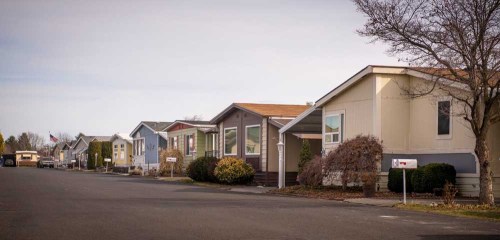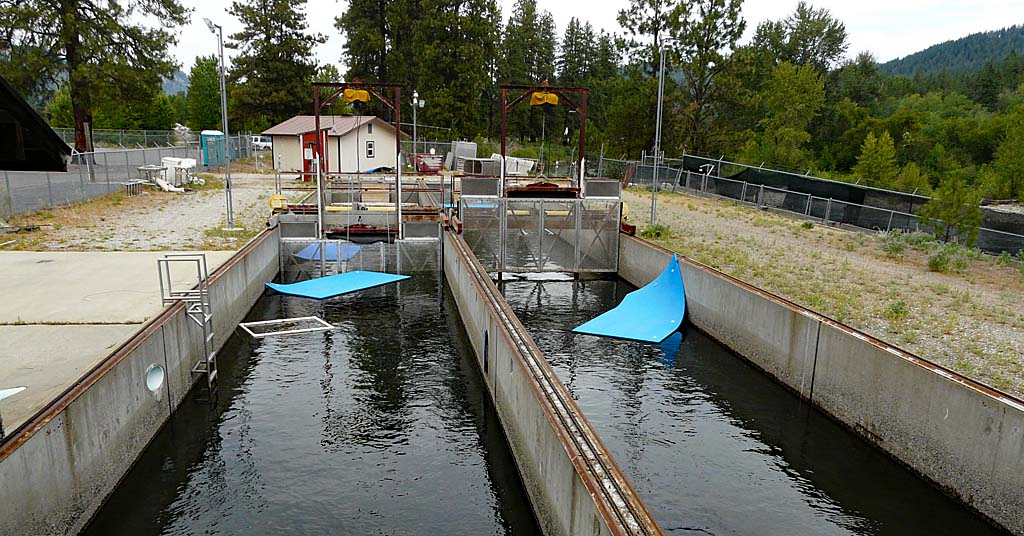Walla Walla leaders take steps to protect manufactured home parks
Published 4:00 am Sunday, February 19, 2023

- A street at Golden West Estates in Walla Walla.
Facing the possible reality of having her home pulled out from under her like a rug, Jan Leonard began to research and advocate for tenant rights in manufactured home parks.
For the past year and a half, Leonard alongside other residents of Golden West Estates, has attended City Council meetings, prepared reports and letters, and publicly commented to bring attention to the plight of rising rents at another manufactured home park in Walla Walla.
Trending
And on Feb. 8, Leonard and other tenants saw their work pay off when Walla Walla leaders changed the law to protect their livelihood.
Future at stake
Unbeknownst to residents, Rancho Villa manufactured home park quietly changed hands, and the tenants have been paying the price since. The manufactured home park sold for $16.1 million to First Commercial Properties NW.
Rental prices immediately began to rise by about 10%, which tacked on about $30 to all tenant bills. The park is a 55-and-older community with many residents on a fixed income.
When she heard about the tribulations that residents of Rancho Villa residents were experiencing, Leonard said she wanted to bring as much attention to it as possible and wanted to support other manufactured home park residents to create more protection for tenants across the state.
“Even though our landlord has no intention to sell, and has always maintained that, we thought it’s just not right for the other people around who are going through this,” Leonard said.
Trending
There has been a wave of mobile home closures across the country, with many being purchased by large conglomerates who redevelop the space into condominiums and apartments.
Leonard’s fear of becoming economically displaced is extremely real. Just last year seven mobile home parks were closed across Washington, and four are already slated to close in 2023.
Leonard said her concern is more than just a local outcry, but a national call for reform of zone coding for manufactured/mobile home parks.
“We’ve done a lot of work with the council, and we’ve given them a lot of information about these changes,” Leonard said. “This is a nationwide epidemic, it’s not just Washington and it’s not just Walla Walla.”
Greg Sterling, who has lived at Rancho Villa for 12 years, said he loves the quaintness and safety of the neighborhood. He does not worry when he leaves town for a couple of days because he knows neighbors will keep an eye out for any suspicious activity.
“It really is a great community to live in,” he said.
Sterling has been attending City Council meetings for more than a year to remind the council about the importance of the issue. He said he wanted to make sure council members heard his concerns.
“When we started, we were unsure as to what the City Council reaction would be,” Sterling said. “They were a little bit skeptical at first.”
Sterling said it was a group effort to represent the seriousness of the situation.
“We put out the word that everybody needed to show up to the council meeting where they would consider a (redevelopment) moratorium,” Sterling said. “A lot of people showed up, and we all told our stories as to who we are as human beings and neighbors.”
More than a dozen park residents commented in an emotional testimony that pushed council members to vote for a moratorium on the redevelopment of mobile and manufactured home parks in Walla Walla.
There was still much more work to be done as the city worked to find an answer to the concerns of the tenants.
“This protects our lives,” Sterling said. “It’s not really just an investment, most of the people who move there plan to stay the rest of their lives. If they had to leave, many of them wouldn’t know where to go.”
Night of the vote
At the Feb. 8 Walla Walla City Council Meeting, city leaders had a big decision to make that would impact the livelihood of those living on fixed incomes in manufactured home parks.
The room was packed with park residents as they waited to hear what City Council members would decide.
Ruth Ann Broman, a Rancho Villa resident, brought a white sign that said “AFFORDABLE HOUSING” in bold blue letters to flash at council members. That sign would echo the theme of many public commenters who had spent more than a year fighting for tenant rights.
Collectively, there are about 600 residential units among the city’s eight mobile/manufactured home parks. Not all of the parks are 55-and-older communities.
The council meeting room was called to order and residents of Rancho Villa and Golden West Estates sat on the edge of their seats waiting for their turn at the microphone.
Pat Leamer, a Rancho Villa resident for 30 years, urged council members to adopt the code change for the sake of keeping housing affordable for the 55+ community.
“Under the new ownership, our rent has increased 68% in two years from $290 to $487 per month,” Leamer said.
Before First Commercial Properties took hold of Rancho Villa, residents had their utilities added into their rent payments, now they had been pulled and billed separately.
Increasing rents across Walla Walla isn’t a new trend though. Sharp rent hikes are being felt by different income levels, according to recent reports about rising rents in Walla Walla and other smaller cities.
According to the U.S. Census Bureau data, the median gross rent in Washington was about $1,500 in 2021, ranking it among the top five U.S. states. Only Hawaii and California had considerably higher rents — along with Washington, D.C. — and Colorado and Massachusetts were a few dollars higher.
During the meeting, Leamer noted his niece’s experience at Rancho Villa to illustrate just how costly the rent hikes have been. Leamer said she is using 55% of her income to pay for rent, only leaving her $603 a month to live on.
“How can she do it,” Leamer asked the council. “She can’t. Her mother and her aunt and uncle are having to help her so she can continue to live there.”
The proposed zoning code amendments added development regulations for the mobile and manufactured home park community, a section on eviction notice standards for the change of use or closure of a park, and a section requiring a notice of sale to tenants. The amendment includes adding a “Manufactured Home Park Community” as a new land use type to the city of Walla Walla 2040 Comprehensive Plan map.
One aspect of the code change allows for an opportunity for tenants to purchase their park. If a park owner decided to sell, tenants would 60 days to state whether they would want to make an offer on the park at a market price. They would then have 120 days to generate the funding. Tenants would have 180 days in total to purchase a manufactured home park from the owners.
“Maybe it’s a little pie in the sky but if residents could form a nonprofit corporation to buy the park, we could control the rents because we don’t have to make profit, we just need to make sure that things are in order,” Leamer said.
Richard Aurili, a Rancho Villa resident, echoed Leamer’s comments concerning affordable housing for seniors. Aurili painted a grave picture to the council about what could happen if these parks are not protected.
“If current zoning remains in place, there is no question that they will continue to extract ever increasing rents and other charges from residents,” Aurili said. “When they receive an offer to buy from a redeveloper, which further enriches them, they will sell out every senior and put them out on the street without a second thought.”
It was not just residents who voiced their concerns at the meeting. Steve Wheeler, the operations manager at Golden West Estates, said he wanted the city to protect the people who reside in manufactured home communities.
“I have 160 homes with hundreds of seniors with the average age of 74,” Wheeler said. “What you are doing to protect this zoning is imperative to these seniors. These are folks that have worked their lives and paid their taxes. We have many veterans. They deserve protection. These are good people.”
Many of the residents in these parks own their homes but not the land they sit on. It may sound like a viable option but moving a mobile home is not as easy or affordable as it seems.
As operations manager, Wheeler said he is responsible for when mobile homes are brought in and removed. “These homes are not easily removed,” Wheeler said. “In some cases, they cannot be removed, they have to be demolished in place because the county and the state will not allow us to move them.”
Wheeler, who has lived in multiple places, recalls all the times he has seen manufactured homes destroyed so a commercial operation could take the place of housing. While in Canada, he said, he saw a manufactured home community demolished for the sake of a Safeway. While in Idaho, a mobile home park was destroyed for a convenience store.
“All those families were displaced,” Wheeler said.
Council’s vote
After an hour’s worth of public comment and deliberation a stillness filled the room as Mayor Tom Scribner announced it was time to vote on the two code amendments.
The motion was moved and seconded to approve ordinance 2023-01 that adopts amendments to the Walla Walla 2040 Comprehensive Plan map. The motion carried unanimously.
Residents stood and cheered for a brief moment as Scribner reminded the group the work was not over yet, and silence overtook the room again.
“What is the pleasure of council with respect to ordinance 2023-02?” Scribner asked.
Council member Ted Koehler answered in moving to adopt the ordinance 2023-02 that adopts amendments to Titles 15 and 20 of the Walla Walla Municipal Code. The motion was seconded. The council members smiled as they said “aye” to unanimously carry the motion.
Cheering erupted in the room as park residents knew their fear of becoming economically displaced drifted a bit farther away.
Long-awaited win
On the night of the vote, Leonard said she was cautiously hopeful about the result.
“I felt that there would probably be a majority who would vote in favor, but I didn’t expect unanimous,” Leonard said. “My initial thoughts were total relief and gratitude. There was gratitude that people in Walla Walla didn’t have to know how close they could have come to disaster.”
Walla Walla is the third city in the state to enact code changes for manufactured park homes with College Place being the first. Leonard hopes the change will have a national impact for residents in manufactured and mobile home parks.
“This is what you want to see with your own local government,” Leonard said. “It’s wonderful.”
Leonard was not alone in her appreciation for the council’s consideration.
“I couldn’t be happier,” Sterling said. “The City Council really came through. It’s clear they care about all citizens of all income levels and ages.”
Sterling said it took a long time and a lot of effort on behalf of both residents and the city to help protect their lives. He is hopeful that the win will continue to push other cities in the state to advocate for tenant rights.
“These laws affect all of the (manufactured home) parks in Walla Walla, not just Rancho Villa,” Sterling said. “I think a lot of people outside of our area have seen what we have done, and we have given them some confidence. I hope it will help other people, too.”









